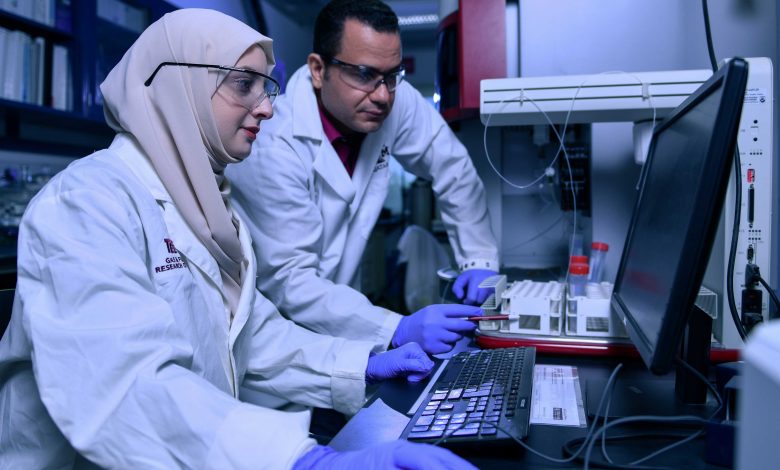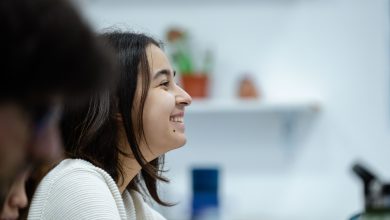
Biofuels production from wastewater .. A joint research project between MME and Qatar University
إنتاج وقود حيوي من مياه الصرف الصحي .. مشروع بحثي مشترك بين البلدية والبيئة وجامعة قطر
QNA – WGOQatar – Doha:
A joint research team from the Ministry of Municipality and Environment and Qatar University is working on a scientific project aimed at producing sustainable biofuels using solar energy and organic matter from sewage and industrial wastewater without using an external source of effort.
The project is part of addressing the main challenges of the scarcity of clean and renewable energy, the use of wastewater, and environmental protection to meet the relevant aspirations and objectives pursued by Qatar’s national vision and development strategies.
“This cooperation between the Ministry of Municipality and Environment and The University is a translation of the agreement signed between the two parties to meet the challenges of clean energy and the sustainability of its resources,” said Prof. Mariam Al-Maaded, Vice President of Qatar University for Research and Higher Studies. She noted that biofuel production is one of the research achievements of this fruitful cooperation.
She added that the research and higher studies sector at Qatar University is keen to cooperate with government institutions and research agencies in order to benefit from the resources and expertise available between the two parties to serve development goals.
For his part, Dr. Mohammed Saif al-Kuwari, Assistant Undersecretary of Ministry of Municipality and Environment, Director of the Center for Environmental and Municipal Studies in the Ministry, stressed the importance of this research project. “Scientific research on sustainable biofuel production using solar energy and organic materials in sewage and industrial wastewater will open up broad and new horizons for optimizing the country’s natural resources, which is in line with Qatar’s Vision 2030,” he said.
“This project promotes investment in energy through sustainable biofuel generation and its use in transportation and industry, where biofuels are renewable energy sources, which are produced by converting organic matter into biofuels, which can be used as fuel for various transportation and other industrial facilities,” he said.
This scientific project has an extra benefit in the conversion of wastewater into hydrogen, an effective alternative approach to biofuel production in Qatar and around the world, because of its high energy content and environmentally friendly combustion.
Biofuels could reduce greenhouse gas emissions by about 1.7 billion tons per year, equivalent to more than 80 per cent of current emissions from transportation and others, thus introducing a self-sustaining energy system for solar biohydrogen production.
Throughout the world, sewage contains high concentrations of organic, inorganic and microbiological pollutants, which are discharged on agricultural streams and inland lakes without reasonable treatment, causing adverse effects on public health and the environment. The use of this water as an energy source is a new and promising approach to meet the requirements of clean and sustainable energy.
“Scientists have devised a microbial electrochemical cell, as a promising, versatile approach and a relatively new method of generating hydrogen (biofuels) from organic matter in sewage by stimulating the activity of microorganisms,” dr. Al-Kuwari said.
He expressed the pride of the scientific research team for this joint research cooperation, which serves the country’s policy to achieve environmental sustainability, provide renewable energy sources and optimize natural resources in order to achieve Qatar’s Vision 2030 and national development strategy 2018-2022, praising the partnership and cooperation with the Public Works Authority, Korea Sea and Ocean University and Qatar National Research Fund for supervising and funding this project.
الدوحة – قنا:
يعكف فريق بحثي مشترك من وزارة البلدية والبيئة وجامعة قطر على مشروع علمي يهدف إلى إنتاج الوقود الحيوي المستدام باستخدام الطاقة الشمسية والمواد العضوية من مياه الصرف الصحي والصناعي دون استخدام مصدر جهد خارجي.
ويندرج المشروع في إطار معالجة التحديات الرئيسية التي تتمثل في ندرة الطاقة النظيفة والمتجددة والاستفادة من مياه الصرف الصحي، وحماية البيئة، تحقيقا للتطلعات والأهداف ذات الصلة والتي تسعى لها رؤية قطر الوطنية واستراتيجياتها التنموية.
وقالت البروفيسورة مريم المعاضيد نائب رئيس جامعة قطر للبحث والدراسات العليا “إن هذا التعاون بين وزارة البلدية والبيئة والجامعة يأتي ترجمة للاتفاقية الموقعة بين الطرفين لمواجهة التحديات حول الطاقة النظيفة واستدامة مواردها”.. مشيرة إلى أن إنتاج الوقود الحيوي يعد من الإنجازات البحثية لهذا التعاون المثمر.
وأضافت أن قطاع البحث والدراسات العليا في جامعة قطر حريص على التعاون مع المؤسسات الحكومية والجهات البحثية بهدف استغلال الموارد والخبرات المتاحة بين الطرفين لخدمة الأهداف التنموية.
من جانبه، أكد الدكتور المهندس محمد سيف الكواري الوكيل المساعد، بوزارة البلدية والبيئة مدير مركز الدراسات البيئية والبلدية بالوزارة على أهمية هذا المشروع البحثي ..وقال “إن البحث العلمي حول إنتاج الوقود الحيوي المستدام باستخدام الطاقة الشمسية والمواد العضوية في مياه الصرف الصحي والصناعي، سيفتح أفاقا واسعة وجديدة لاستغلال الموارد الطبيعية للبلاد الاستغلال الأمثل، وهو ما يتماشى مع رؤية قطر 2030”.
وأضاف “هذا المشروع يعزز الاستثمار في مجال الطاقة من خلال توليد الوقود الحيوي المستدام واستخدامه في النقل والصناعة، حيث يعتبر الوقود الحيوي من مصادر الطاقة المتجددة، والذي يتم إنتاجه عن طريق تحويل المواد العضوية إلى وقود حيوي، حيث يمكن استخدامه كوقود لوسائل النقل المختلفة وغيرها من المنشآت الصناعية”.
وأفاد بأن لهذا المشروع العلمي قيمة مضافة لتحويل مياه الصرف الصحي إلى هيدروجين، وهو نهج بديل فعال لإنتاج الوقود الحيوي في قطر وجميع أنحاء العالم، وذلك بسبب محتواه العالي من الطاقة والاحتراق الصديق للبيئة.
وأوضح أنه يمكن للوقود الحيوي أن يختزل انبعاثات الغازات الدفيئة بنحو 1.7 مليار طن في العام، أي ما يعادل أكثر من 80 في المائة من الانبعاثات الحالية الناجمة عن وسائل النقل وغيرها، وبالتالي يؤدي إلى إدخال نظام طاقة مستدام ذاتيا لإنتاج الهيدروجين الحيوي بالطاقة الشمسية.
وأشار إلى أن مياه الصرف الصحي، في العالم كله، تحتوي على تركيزات عالية من الملوثات العضوية وغير العضوية والميكروبيولوجية، يتم صرفها على الجداول الزراعية والبحيرات الداخلية دون معالجة معقولة، وهو ما يتسبب في تأثيرات ضارة بالصحة العامة والبيئة.. مبينا أن استغلال هذه المياه كمصدر للطاقة نهج جديد وواعد لتلبية متطلبات الطاقة النظيفة والمستدامة.
وذكر الدكتور الكواري أن العلماء ابتكروا خلية كهروكيميائية ميكروبية، كمنهج واعد متعدد الاستخدامات وطريقة جديدة نسبيا لتوليد الهيدروجين (الوقود الحيوي) من المواد العضوية المتواجدة في مياه الصرف الصحي بتحفيز نشاط الكائنات الحية الدقيقة”.
وعبر عن فخر فريق البحث العلمي بهذا التعاون البحثي المشترك الذي يخدم السياسة العامة للدولة الهادفة إلى تحقيق الاستدامة البيئية وتوفير مصادر للطاقة المتجددة والاستغلال الأمثل للموارد الطبيعية بما يحقق رؤية قطر 2030 واستراتيجية التنمية الوطنية 2018 – 2022، مثمنا الشراكة والتعاون مع هيئة الأشغال العامة (أشغال)، وجامعة كوريا للبحار والمحيطات، والصندوق القطري لرعاية البحث العلمي المشرف والممول لهذا المشروع.



